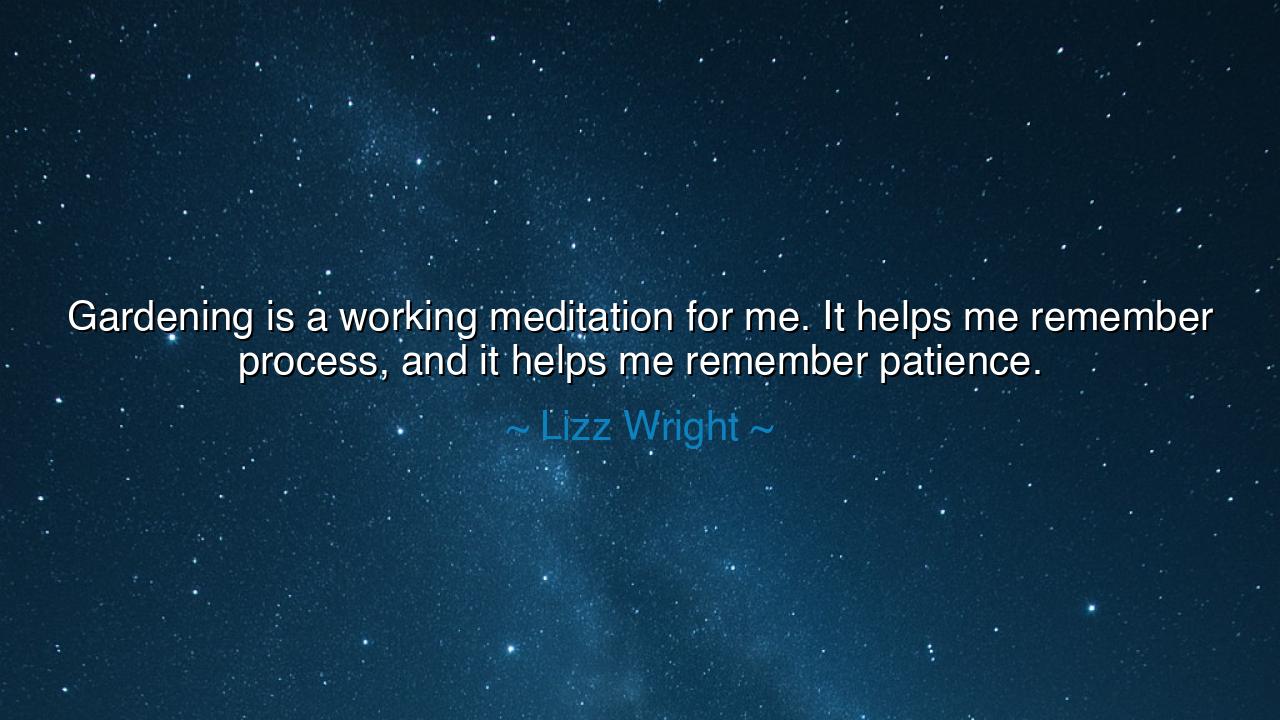
Gardening is a working meditation for me. It helps me remember
Gardening is a working meditation for me. It helps me remember process, and it helps me remember patience.






The words “Gardening is a working meditation for me. It helps me remember process, and it helps me remember patience” were spoken by Lizz Wright, the American jazz and gospel singer whose music, like the soil she tends, carries both depth and grace. In this reflection, Wright reveals not merely her fondness for the garden, but her understanding of it as a spiritual discipline, a sacred dialogue between human hands and divine creation. Her words flow from an ancient wisdom: that labor can be prayer, that every act done with mindfulness becomes a path toward peace, and that the soil teaches lessons no book or stage can offer — the art of process, and the virtue of patience.
When she calls gardening a “working meditation,” she captures a truth that monks and mystics have known for centuries — that stillness need not mean inactivity. Meditation is not always the absence of motion; it is the presence of awareness. In the act of tending the earth, pulling weeds, and nurturing seedlings, Wright finds the same quiet focus that others find in prayer or silence. Her hands move, but her heart rests. The garden becomes her temple, each small act a sacred rhythm — planting, watering, waiting — until the labor itself becomes a form of worship. The ancients would have called this contemplative work, the union of body and spirit in service of life’s eternal cycle.
Her phrase “it helps me remember process” carries profound significance. In the modern world, people are obsessed with outcomes — with instant results and immediate success. But the garden does not obey such impatience. It teaches that everything unfolds in its own time, that growth is not an event but a journey. Seeds do not bloom because we demand it; they bloom because we nurture and wait. In this way, gardening mirrors the creative process — the same process Wright knows as an artist. A song, like a seed, must be written, tended, refined, and allowed to mature. In both soil and song, the lesson is the same: trust the process, for every stage — even the unseen ones — has purpose.
And then she adds, “it helps me remember patience.” Patience — that ancient virtue so easily forgotten — is the gardener’s greatest teacher. In the garden, impatience yields nothing but frustration. No amount of effort can force a flower to bloom before its appointed time. Wright’s meditation in the garden becomes an act of surrender, a practice of humility before the laws of nature and of God. She learns again what every wise soul must: that time is not our enemy but our teacher. To wait without despair, to trust that unseen growth is still growth — this is the spiritual lesson buried in every seed.
History gives us many who found wisdom in such humble work. Leo Tolstoy, one of the greatest writers who ever lived, spent his later years tending his fields by hand. In the rhythm of his scythe and the scent of the soil, he found the peace that fame and philosophy could not give. Likewise, the Japanese monks of old cultivated their rock gardens, not to display perfection, but to still the mind through repetition and care. In this lineage, Lizz Wright stands as a modern contemplative, her garden a living teacher that reminds her — and through her words, reminds us — that creation, whether of life or art, cannot be rushed.
Her message is also one of wholeness. By linking meditation with work, she bridges the sacred and the ordinary. The act of gardening becomes a metaphor for living itself: to plant intentions carefully, to nourish them daily, to accept the seasons of dormancy, and to trust that renewal will come. She teaches that peace does not descend upon us in silence alone — it is cultivated through the steady, mindful tending of life’s responsibilities. Each weed pulled, each seed sown, is a practice in awareness, humility, and love.
The lesson of her quote is both gentle and profound: peace is not found by escaping life, but by entering it fully — with patience, with presence, and with faith in the process. The soil teaches what the spirit forgets: that all things take time, and that every effort, however small, contributes to the great unfolding of life.
Practical actions: Begin your own “working meditation.” Whether through gardening, cleaning, cooking, or crafting, approach your daily labor with mindfulness. Let each movement remind you of patience. When frustration arises, recall the quiet seed beneath the soil, growing unseen yet surely. Nurture what is before you, not for reward, but for reverence. For as Lizz Wright reminds us, when we work with care and wait with trust, we become both gardener and garden — the hands that shape life, and the life being shaped.






AAdministratorAdministrator
Welcome, honored guests. Please leave a comment, we will respond soon